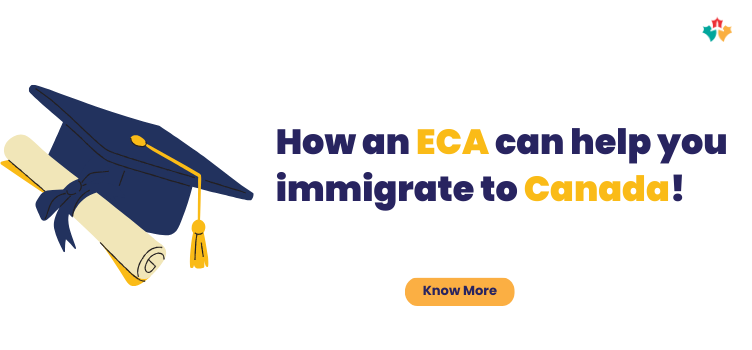Our Blogs
How an ECA can help you immigrate to Canada!

Using an ECA to Improve Your Immigration to Canada
When people immigrate to Canada, they often need to prove how their education from their home country matches Canadian standards. An Education Credential Assessment (ECA) helps them do this, aiding in immigration processes. However, ECAs can also serve other purposes beyond immigration.
What is an ECA?
An ECA is like a report card for your education from another country, showing how it matches up with Canadian standards. You can get an ECA from certain organizations approved by the Canadian government. These organizations offer different types of ECAs for things like getting a job, professional licenses, or immigrating to Canada. It’s important to pick the right type of ECA for what you need.
What is included in my ECA for immigration?
ECA for Canadian immigration typically includes:
- Verification of your education history.
- Canadian equivalence of your credential.
- Identification and description of the assessed credential:
- Name and year of credential.
- Entry requirements and program length.
- Issuing institution’s name and status.
- Major/specialization of the credential.

What Effect Does an ECA Have on My Ability to Immigrate?
Getting an ECA not only shows you’re eligible for immigration, but it can also boost your chances. In Canada, having more education can help with immigration. ECAs are how the government checks your education level. For instance, in the immigration system, the higher your education, the more points you get, which helps your chances of being chosen.
Therefore, getting your credential assessed may increase your chances of receiving an invitation to apply (ITA) under the Express Entry system, by way of increasing your overall points score.
Expanding Immigration Chances with Different ECAs
Different types of ECAs can be helpful depending on your situation. For instance, you might get one ECA for your education to qualify for a program, and another for a technical degree or professional certification for work reasons. Both could help you in the immigration system.
For example, if you have a one-year college degree and a professional certification in a skilled trade, you might assess both with different ECAs. Even if the certification doesn’t give you extra education points, it can still boost your job chances in Canada. This could be especially useful for people in bridging programs, trying to get a Canadian certification based on their previous credentials.
This can help you find work in Canada, which gets you points in the immigration system. It might also speed up getting a Canadian certification in a licensed job. This could make you eligible for different Provincial Nominee Program (PNP) streams, depending on your situation.
PNPs are programs by provinces or territories to nominate newcomers. They often consider candidates’ education, job skills, and other factors.
Get in touch with SPS Canada
Receive professional advice on any of your questions regarding Canadian immigration. get in touch with us, experienced immigration consultants from SPS Canada. For additional information, contact support@spscanada.com (Canada) or support.amd@spscanada.com
(Ahmedabad), or by phone at (1) 905-362-9393 (Canada) or +919586226232 (Ahmedabad).
Comments
Our Clients
We're Trusted Globally
We are a regulated immigration practicing firm, providing advice and
solutions on matters related to Canadian immigration.














